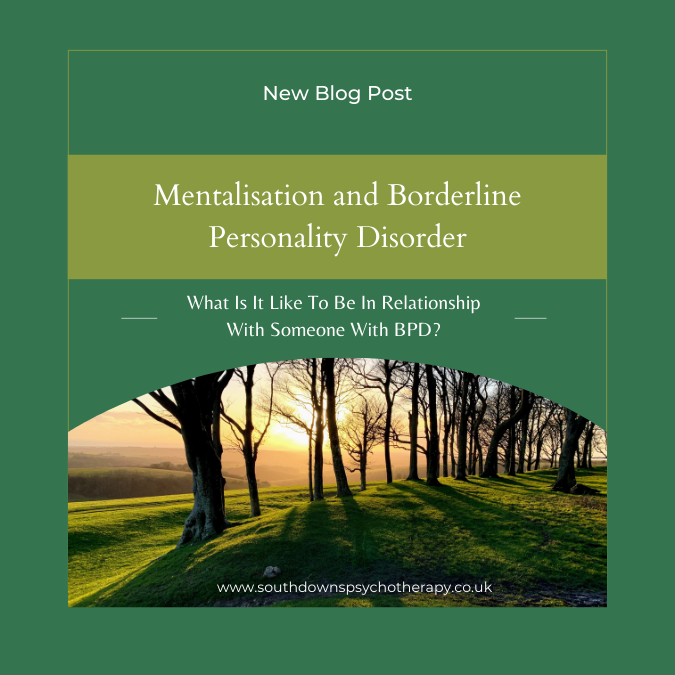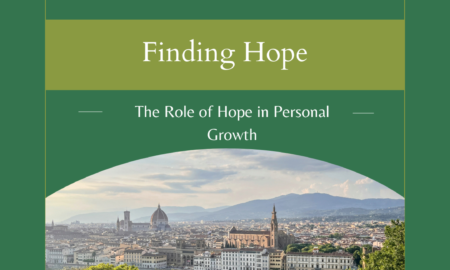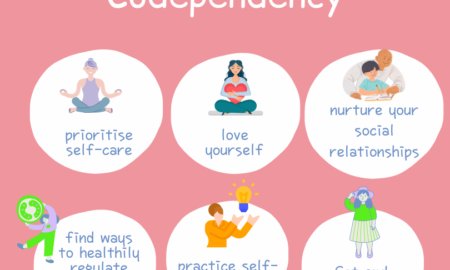In a Relationship with Someone with BPD?

Being in a relationship with someone who has Borderline Personality Disorder (BPD) can be emotionally intense and, at times, confusing. You may experience moments of deep connection, only to be followed by conflict or emotional distance. While it can be challenging, understanding what drives these behaviours can help you respond with empathy and maintain healthier boundaries.
This post explores the emotional patterns of people with BPD through the mentalisation model, which provides insights into how they process thoughts, emotions, and relationships.
What is Borderline Personality Disorder (BPD)?
BPD is a mental health disorder characterised by emotional dysregulation, unstable relationships, and a fragile sense of self. People with BPD often struggle to manage their emotions and may experience intense fears of abandonment, leading to behaviours that can seem erratic or confusing to loved ones.
At the core of BPD is a difficulty with mentalising—the ability to reflect on one’s own thoughts and emotions while also considering the thoughts and feelings of others. When someone with BPD is emotionally distressed, their capacity to mentalise can collapse, making it harder to navigate relationships calmly and thoughtfully.
It is also crucial to mention that the term Borderline Personality Disorder is actually synonymous with Emotionally Unstable Personality Disorder. The terms are used interchangeably and describe the same set of symptoms.
Emotional Turbulence and Hyper-Sensitivity
One hallmark of BPD, or EUPD is emotional dysregulation, where emotions can shift quickly from one extreme to another. In relationships, this may look like a loved one feeling deeply connected one moment and then suddenly hurt, angry, or distant the next. Hence, the renaming of BPD to Emotionally Unstable PD as this more accurately reflects what is going on.
People with BPD are also hyper-sensitive to social cues, such as tone of voice or body language. For example, they might notice you crossing your arms and assume you are upset, even if that wasn’t your intention. This sensitivity can lead to misunderstandings and conflicts, as they often make inaccurate assumptions about what others are thinking or feeling.
What you might hear:
- “Your tone sounds like you’re annoyed with me.”
- “If you really cared, you’d tell me right away.”
This intense focus on others’ behaviours stems from a deep fear of rejection or abandonment.
Impulsivity and Conflict
People with BPD often act on impulse, especially during emotional distress. This can result in quick decisions or harsh reactions without pausing to reflect on the consequences.
For example:
- They might lash out during an argument.
- They may assume you don’t care because you took time to reply to a message.
These behaviours can be exhausting for loved ones, especially when they feel like they’re constantly walking on eggshells.
The mentalisation model explains that this impulsivity is tied to an over-reliance on automatic emotional reactions rather than reflective thinking. The person with BPD may not pause to consider other perspectives, it is challenging for them to genuinely appreciate other’s perspectives, making it difficult for them to reflect on how their actions affect others. Perhaps you have been confused by someone’s demands/preferences for your sexual relationship and little awareness is shown of what it means to the other person. These impulsive behaviours can leave their loved ones feeling hurt or confused. It can also be exhausting for the person trying desperately to remain consistent and stable in the face of such instability.
The Push-Pull Dynamic in Relationships
One of the most challenging aspects of being in a relationship with someone with BPD is the push-pull dynamic. They may crave closeness but then pull away suddenly when the relationship feels too overwhelming.
This happens because the other person’s emotions can feel psychologically invasive. When someone with BPD feels too influenced by their partner’s emotional state, they may fear losing their identity. To protect themselves, they may withdraw or create emotional distance.
What you might experience:
- They might express intense affection, only to suddenly become distant or critical.
- They may propose long-term commitments and later seem to dismiss those plans entirely.
This dynamic can be emotionally draining for both partners.
How to Respond with Compassion and Boundaries
Understanding that BPD behaviours are rooted in emotional pain and vulnerability can help you respond with more empathy. However, it’s also essential to set boundaries to protect your own well-being.
Here are some practical tips for navigating relationships with someone with BPD/EUPD:
- Stay Calm and Reflective
When emotions run high, try to remain calm and reflective. Avoid escalating conflicts by matching their intensity. Instead, pause and encourage a thoughtful conversation. - Avoid Taking Things Personally
Many of the reactions you may experience from your loved one stem from their internal struggles, not from something you’ve done. Remind yourself that their behaviours are a reflection of their pain, not a judgement of you. - Encourage Mentalising
Help your loved one slow down and reflect on their thoughts and feelings before acting. Ask open-ended questions like:
- “What do you think is happening right now?”
- “How are you feeling about that?”
These questions can encourage them to process their emotions more thoughtfully.
4. Set Boundaries with Compassion
It’s important to set limits to protect your emotional well-being. For example, you can set boundaries around how you communicate during conflicts or how you manage emotional outbursts. Do so with compassion, making it clear that your boundaries are about protecting the relationship, not rejecting the person.
Why Relationships Can Be So Painful for People with BPD
People with BPD experience profound emotional pain. One of the most distressing feelings is emptiness, a sense of having no stable identity or sense of self. To cope with this emptiness, they may seek validation from others. A series of unfulfilling short-term relationships may be a way of trying to get the validation required and to combat the empty feeling as a way of feeling something real or enlivening. Even engaging in ‘the chase’ may be indicative of the need for the temporary relief from the overwhelming emotional void. The mentalising capacity is also often compromised and the responses of others are not interpreted accurately. This leads to misunderstandings and conflicts, especially in close relationships where the stakes feel highest.
Recognising Patterns from Your Own Life
It’s also important to reflect on your own relationship patterns. If you grew up with a parent or caregiver who had BPD traits, you may find yourself drawn to relationships with similar dynamics. Understanding your own emotional responses and attachment patterns can be key to building healthier relationships.
Conclusion
Being in a relationship with someone who has BPD is challenging, but understanding the mentalisation model can provide insight into their behaviours. While empathy is important, so is setting healthy boundaries and ensuring your own emotional needs are met.
Seeking therapy—for both you and your loved one—can make a significant difference in navigating these relationships with more compassion and stability.
If you recognise any of the above traits in yourself or in your relationship get in touch to find out about how Transactional Analysis Psychotherapy informed by Mentalisation-Based Therapy can support you to move forward in a fulfilling, compassionate and happier way.
You may also be interested in...

Finding Hope
Why Hope Matters on Difficult Days This morning the Happiful magazine newsletter landed in my inbox and the title of the newsletter was “It’s OK to look for hope”. It…

New Year, Fresh Start: How Reflection Fuels Personal Growth
As the New Year begins, many of us feel a renewed sense of purpose, setting resolutions that reflect our hopes for personal growth and change. While it’s true that committing…

The Value of Downtime
In our fast-paced world, where productivity and constant connectivity are often celebrated, the concept of downtime can feel counterintuitive or even indulgent. However, taking time to rest and recharge is…

Navigating the Maze of Codependency
Welcome, avid seekers of psychological insight, to a jump into the labyrinthine world of codependency. Within the intricate tapestry of human relationships, codependency weaves a subtle yet pervasive thread, often…

Why We Crave Connection
In a world filled with digital distractions and constant busyness, it's easy to forget just how essential human connection is to our well-being. But the truth is, we all crave…

Improve Your Mental Strength
Ever wondered why some people seem to bounce back effortlessly from life's curveballs while others struggle to regain their footing? The secret lies in mental strength – that intangible power…
Ready to Make a Change? Book an Initial Consultation Today
If you have any questions at all about therapy or would like to make an appointment, get in touch. I will usually be able to respond to you within 24 hours.
